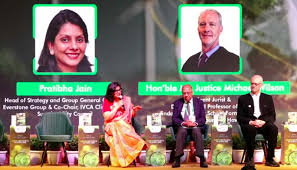NEW DELHI: Days after the two-week UN climate summit closed in Belem, climate observers called it a ‘COP of talk,’ noting a small win with the establishment of a ‘just transition mechanism’ but a letdown on finance decisions for which developing countries were clamouring.
The Centre for Science and Environment (CSE) team, which witnessed and reported on the proceedings on-site at COP30 in Belem, said, “It was billed as the ‘COP of Truth’. But it ended up becoming another ‘COP of Talk’ — mouthing dialogues, promising roadmaps and delivering little of substance beyond one unclear mechanism.”
While the COP30 does not mention a fully-financed transition away from fossil fuels, the adoption of the ‘just transition mechanism’, which secures the interests of workers and communities in the energy transition, provides a pathway for countries to transition away from fossil fuels in a just, equitable manner.
“The adoption marks an important win for developing countries, which have demanded a coordinated approach that binds fragmented efforts on just transition. However, with timelines still uncertain, technical functions undefined, and no guaranteed finance for implementation, concerns remain that the mechanism could be empty and meaningless,” said Rudrath Avinashi, programme officer, Climate Change, CSE.
Avantika Goswami, programme manager, Climate Change, CSE pointed out that the collective strength of the G77 and China bloc was evident and kept its priorities in focus.
“However, the disruptive tactics deployed by developed countries, including scapegoating of large developing countries as ‘blockers’ of ambition and attempts to divide-and-rule the developing blocs, exposed a major crisis of legitimacy for the COP process. It is unclear who it serves and if it remains fit for purpose,” she said.
The much anticipated “tripling” of adaptation finance was also watered down: pushed to 2035, with no clarity on who pays or from what baseline.
“Across tracks, developing countries pushed for stronger accountability, shorter timelines on finance delivery, and a focus on public finance, but saw little convergence. The mistrust from the Baku finance outcome loomed large at COP 30 despite the absence of a headline finance agenda”, said Sehr Raheja, programme officer, Climate Change at CSE.
Speaking at IVCA GreenReturns Summit 2025 on Monday, Senior Fellow – Global Economy and Development, Center for Sustainable Development Amar Bhattacharya commented that careful thought must be given to just transitions.
“Because if the transitions are not just, they will not be sustainable. Our numbers show that emerging markets and developing countries need to invest about 3.2 trillion dollars by 2035. More than 2 trillion of that is required for the clean energy transition across renewable energy, the grid, storage, and decarbonisation, not only in easier sectors like transport, but also in more difficult areas.”


